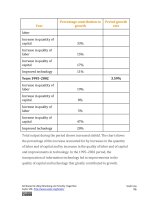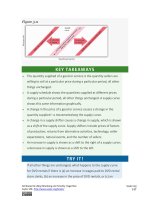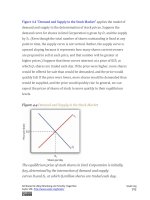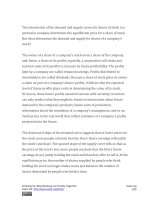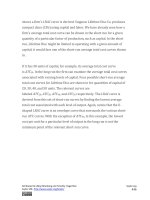Authors libby rittenberg 98
Bạn đang xem bản rút gọn của tài liệu. Xem và tải ngay bản đầy đủ của tài liệu tại đây (415.63 KB, 1 trang )
time to study that could have been spent working, earning income, and
thus engaging in a higher level of consumption. If you are like most
students, you are making this choice to postpone consumption because
you expect it will allow you to earn more income, and thus enjoy greater
consumption, in the future.
Think of an economy as being able to produce two goods, capital and
consumer goods (those destined for immediate use by consumers). By
focusing on the production of consumer goods, the people in the economy
will be able to enjoy a higher standard of living today. If they reduce their
consumption—and their standard of living—today to enhance their ability
to produce goods and services in the future, they will be able to shift their
production possibilities curve outward. That may allow them to produce
even more consumer goods. A decision for greater growth typically
involves the sacrifice of present consumption.
Arenas for Choice: A Comparison of Economic
Systems
Under what circumstances will a nation achieve efficiency in the use of its
factors of production? The discussion above suggested that Christie Ryder
would have an incentive to allocate her plants efficiently because by doing
so she could achieve greater output of skis and snowboards than would be
possible from inefficient production. But why would she want to produce
more of these two goods—or of any goods? Why would decision makers
throughout the economy want to achieve such efficiency?
Economists assume that privately owned firms seek to maximize their
profits. The drive to maximize profits will lead firms such as Alpine Sports
Attributed to Libby Rittenberg and Timothy Tregarthen
Saylor URL: />
Saylor.org
98
